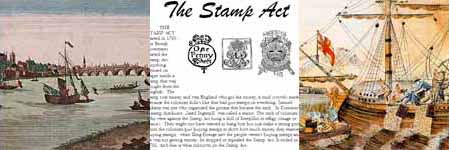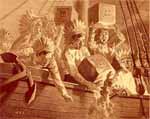Activity 1
Essential Question
- How are people affected by taxes?
Background
Mercantilism was the guiding economic philosophy of European governments, including England, for most of the 16th through the 18th centuries. Under mercantilism, the government controlled many aspects of economic activity with the thought that this would achieve greater general welfare. Policies that were thought to increase national wealth by decreasing imports and increasing the amount of exports were of particular importance. From the colonists point of view, mercantilism interfered with their economic right to free trade: by regulating trade and commerce, by supporting specific industries, by determining what would be produced through the payment of bounties for the production of specified commodities needed by England, and by establishing laws that restricted the freedom to trade with other countries.

In 1763, after the conclusion of the French and Indian War, the British government struggled to pay war debts. The British government believed that the colonies should share some of the burden of debt payment. The result was passage of a series of tax laws including the Sugar Act, the Stamp Act, the Townshend Acts, and the Tea Act. These laws were designed to extract revenue from the colonists. When people pay taxes, they expect to receive public services worth the cost of the taxes. The colonists did not think that they were receiving services from the British government equal to the costs of the taxes. The colonists believed that the taxes benefited English citizens elsewhere more than they benefited colonists in North America. With the imposition of these many taxes, the colonists thought that they were being taxed unfairly because they had no representation in the English parliament. One of the rallying cries became, "No Taxation without Representation."
Instructional Strategies
 |
Strategy 1 |
Simulation
Divide the students into two groups - one group representing tea merchants and the other group consumers of tea. Distribute 4 tea bags to each merchant. Tell the merchants that tea will sell for 5 shillings. Distribute 12 shillings to each consumer. Allow time for the consumers to shop.Discuss this chart with the students.
|
Number of Teabags Sold
Round One Round Two Round Three
|
Total Revenue | Tax | Total Revenue After Taxes |
Have students record their transactions on the chart.
- Round One: Collect tea bags from consumers and count the number of tea bags sold. Record the number on the chart. Merchants will record their earnings in the revenue columns.
- Round Two: Repeat the process. However, this time a two shilling tax on tea has been imposed. Tea now sells for seven shillings. Record the information as before being sure to record the tax in the tax column.
Discuss these questions with the students:
- What happened to the number of tea bags sold in round one compared with round two? Explain the reason for this.
- What happened to the total revenue merchants received? Explain the reason for this.
- How do you think the English consumers and the English merchants felt about the tax on tea? How did you feel? What might you do about it?
Conduct one more round of transactions. Quietly inform the consumers that some of them will boycott tea because of the tax. Record number of tea bags sold, revenue, taxes, and revenue minus taxes in the columns on the chart.
Discuss these questions with the students:
- What happened to the number of tea bags sold in round three compared with round two? Explain.
- What happened to the total revenue merchants received? Why?
- Why didn't the merchants refuse to pay the tax?
- What are taxes?
- Who is affected by taxes?
- What is the effect of taxes on the consumers' ability to buy goods and services?
- What is the effect of taxes on the producers' ability to sell goods and services?
 |
Strategy 2 |
Map Activity Higher Order Thinking
- Use this website to find a map of the triangular trade.
- Locate the following areas on the map:
- North America
- Europe
- England
- The Caribbean Islands
- Africa
- Atlantic Ocean
- The Original Thirteen Colonies
- Talk about where they areas are located. Use a blank map of the world and create your own triangular trade map by drawing arrows to create the triangle.
- England to North America
- England to the West Coast of Africa
- Africa to the Caribbean Islands
- The Caribbean Islands to the Thirteen Colonies
- Talk about what might be exported in each of these areas that might be of interest to people in other parts of the world. Talk about what might be imported into each of these areas. Illustrate these exports and imports by labeling the arrows you have created on your map. For example, you might include:
- Sugar, rum, tobacco, coffee
- Pots, pans, guns, alcohol, horses
- Slaves
- Put the word "mercantilism" on the overhead and ask the students to do some additional research to:
- Find out how England used the idea of mercantilism to control trade and make money.
- Find out how the triangular trade was an example of mercantilism.
- Find out how mercantilism used taxes (tariffs) to control economic policy.
- Have the students use their computer research and their maps to discuss the following questions:
- Who was involved in the triangular trade?
- How was this an example of mercantilism?
- Who benefited the most from this policy?
- Who benefited the least from this policy?
- What conflict would result when England tried to enforce this policy on the thirteen colonies? Explain your answer.
What potential conflicts might arise when one country attempts to enforce economic policies that are not mutually beneficial to all countries concerned? How do taxes (tariffs) add to this problem?
 |
Strategy 3 |
Role Play/Simulation Perspective Taking
- Use a movie or CD to review the economic activities of the thirteen colonies.
- Divide the class into four groups with a particular focus on:
- Northern Colonies
- Boston Fisherman
- New England Ship Builder
- Shop Keeper in a Colonial Village
- Southern Colonies
- Southern Tobacco Planter
- Middle Colonies
- English Military Commander
- Grain Farmer
- Merchant
- Western Frontier
- Land Speculator
- Frontier Trapper
- Small Farmer
- Northern Colonies
- Have each group do some additional research on the computer to find out how each of these individuals might have felt about mercantilism and how their area of North American should react to this policy.
- Call a meeting of these representatives to discuss the policy. Provide each group with sufficient time to prepare their representative(s) for the meeting. Alert them they might be expected to react to the following questions:
- How do they feel about paying higher prices for imported goods because of the tariffs (taxes)?
- How do they feel about sending their products to England and not being allowed to sell to other countries?
- How do they feel about restrictions on manufacturing their own products?
- How do they feel about using some of these monies to enable England to protect their other colonies?
Are people today still talking about taxes? How do you feel about taxes? Should they be higher or lower? Give supporting reasons for your answer.

 Module Menu
Module Menu Printable View
Printable View

 Score Guide
Score Guide